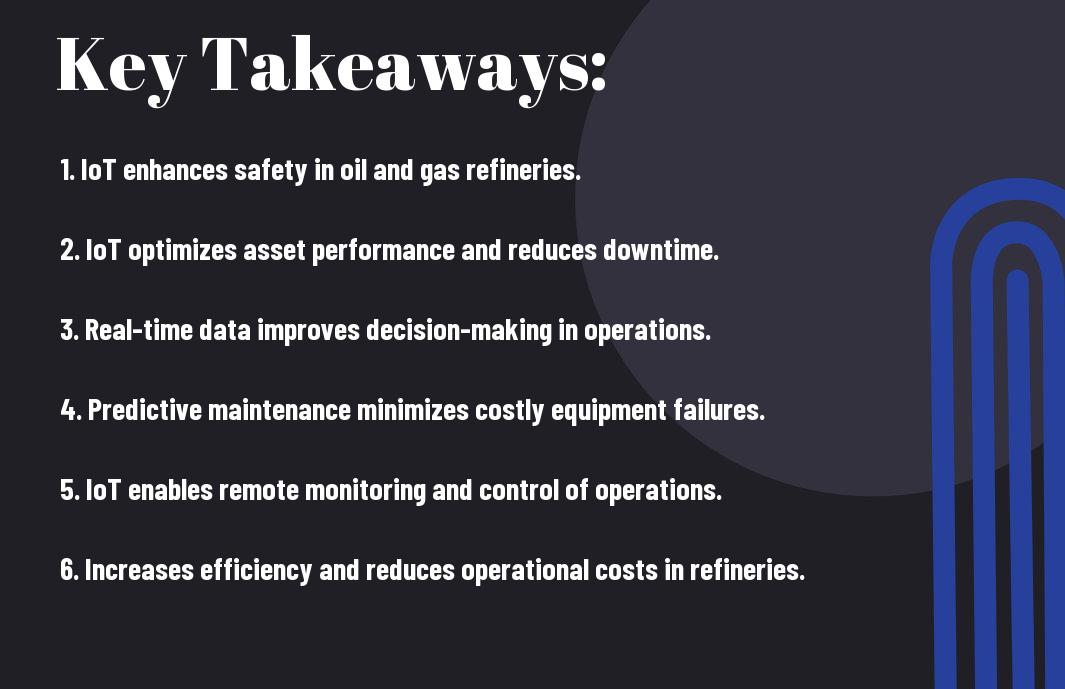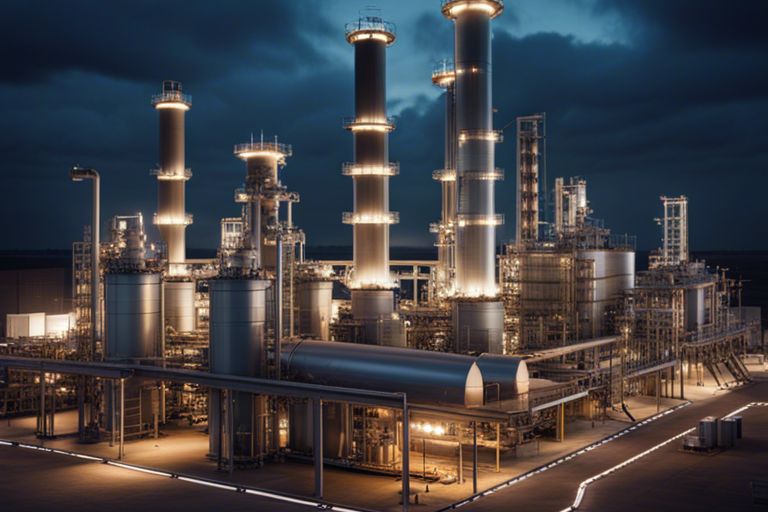Operations in oil and gas refineries have long been known for their intricate processes, delicate balance between efficiency and safety, and the critical role they play in fueling the world’s energy needs. With the advent of IoT (Internet of Things) technology, these operations are undergoing a transformation that promises to revolutionize the industry. From real-time monitoring of equipment and predictive maintenance to increased efficiency and safety measures, IoT is reshaping how refineries operate. In this blog post, we examine into the impact of IoT on oil and gas refineries and explore the myriad ways in which this technology is changing the landscape of one of the world’s most vital industries.

The Blueprint of IoT Implementation
Sensor Deployment and Data Collection
On the journey towards implementing IoT in oil and gas refineries, the first crucial step lies in sensor deployment and data collection. Sensors act as the eyes and ears of the operation, capturing data on various parameters such as temperature, pressure, and flow rates. This data is then aggregated and stored for further analysis and decision-making.
Real-Time Monitoring and Control Systems
Blueprint
Real-time monitoring and control systems are the heart of IoT implementation in oil and gas refineries. These systems enable operators to have instantaneous access to critical operational data and the ability to make real-time decisions. With the implementation of IoT, refineries can optimize their processes, identify inefficiencies, and prevent potential hazards before they escalate.
Implementation
It is crucial to emphasize the importance of real-time monitoring and control systems in IoT implementation in oil and gas refineries. This technology not only enhances operational efficiency but also plays a significant role in ensuring the safety and security of the entire operation. By leveraging IoT for real-time monitoring and control, refineries can revolutionize their traditional workflows and achieve unprecedented levels of optimization.
Enhancing Efficiency and Safety
Predictive Maintenance and Downtime Reduction
Predictive maintenance technologies in IoT are revolutionizing operations in oil and gas refineries by enabling proactive equipment maintenance. By analyzing real-time data and machine learning algorithms, these systems can predict when equipment is likely to fail, allowing for timely interventions and reducing unplanned downtime significantly.
A New Era of Safety Protocols
Maintenance in oil and gas refineries plays a crucial role in ensuring operational safety. The implementation of IoT devices for monitoring equipment conditions in real-time enables the early detection of potential hazards, helping to prevent accidents and ensuring a safer working environment for refinery personnel.
To safeguard against dangerous incidents, increased automation helps in enforcing safety protocols rigorously. IoT sensors can detect deviations from normal operating conditions and trigger immediate responses to mitigate risks. By integrating IoT solutions into safety procedures, refineries are embracing a new era of enhanced safety standards.
Economic and Environmental Impact
Cost Optimization through IoT
Optimization is crucial in the oil and gas industry, and IoT is a game-changer in achieving cost efficiency. By leveraging IoT technologies, refineries can enhance asset performance, monitor equipment health in real time, and predict maintenance requirements to mitigate downtime and reduce operational costs. According to IoT Use Cases in Oil & Gas: Transformative Applications, implementing IoT solutions can lead to substantial savings by optimizing processes and improving overall operational efficiency.
Driving Sustainability in Oil and Gas Operations
One of the most pressing issues in the oil and gas industry is sustainability, and IoT technologies play a significant role in driving environmental responsibility. IoT enables refineries to monitor emissions, reduce energy consumption, and enhance safety protocols. Environmental regulations are becoming more stringent, and companies that fail to adopt sustainable practices risk facing fines and tarnishing their reputation. By embracing IoT solutions, oil and gas refineries can proactively address environmental concerns and ensure compliance with regulatory standards.
Addressing Challenges and Considerations
Navigating the Data Deluge
Any organization in the oil and gas industry faces the challenge of managing massive amounts of data generated by IoT devices. This data deluge can be overwhelming, leading to potential inefficiencies and missed opportunities for optimization. Through advanced analytics and AI algorithms, companies can sift through this sea of data to extract valuable insights and make informed decisions in real time, enhancing operational efficiency and productivity.
Security and Regulatory Compliance
The security and regulatory compliance landscape in the oil and gas industry is critical due to the sensitive nature of operations and the potential consequences of breaches. The implementation of IoT devices introduces new vulnerabilities that can be exploited by malicious actors, posing significant risks to operations. This is where a robust cybersecurity framework and strict adherence to industry regulations become paramount to ensure the integrity and confidentiality of data, as well as compliance with standards set by regulatory bodies.
 ## Conclusion Ultimately, the integration of IoT in oil and gas refineries represents a significant shift in operational efficiency and safety. By leveraging IoT devices and sensors, companies can monitor equipment in real time, analyze data to predict maintenance needs, and optimize processes for increased productivity. This technological revolution is not only transforming the way operations are conducted but is also enhancing the overall performance and sustainability of oil and gas refineries. To probe deeper into how IoT is revolutionizing businesses in the oil and gas sector, check out IoT in Oil and Gas: Revolutionizing Businesses.
## Conclusion Ultimately, the integration of IoT in oil and gas refineries represents a significant shift in operational efficiency and safety. By leveraging IoT devices and sensors, companies can monitor equipment in real time, analyze data to predict maintenance needs, and optimize processes for increased productivity. This technological revolution is not only transforming the way operations are conducted but is also enhancing the overall performance and sustainability of oil and gas refineries. To probe deeper into how IoT is revolutionizing businesses in the oil and gas sector, check out IoT in Oil and Gas: Revolutionizing Businesses.
How Is IoT Technology Impacting Operations in Oil and Gas Refineries?
IoT technology is enhancing substation monitoring with IoT in oil and gas refineries, allowing for real-time data collection and analysis. This integration enables predictive maintenance, remote monitoring, and improved operational efficiency. As a result, the industry can reduce downtime, minimize safety risks, and optimize overall performance.
FAQ
Q: What is IoT and how is it transforming operations in oil and gas refineries?
A: The Internet of Things (IoT) refers to the network of interconnected physical devices that are embedded with sensors, software, and other technologies to exchange data with other devices and systems over the internet. In oil and gas refineries, IoT is transforming operations by enabling real-time monitoring, predictive maintenance, and optimization of equipment and processes.
Q: How does IoT improve safety in oil and gas refineries?
A: IoT helps improve safety in oil and gas refineries by providing real-time monitoring of critical equipment and processes, detecting potential hazards early, and automating emergency response procedures. This proactive approach minimizes risks to personnel and assets, enhancing overall safety in the refinery environment.
Q: What are the key benefits of implementing IoT in oil and gas refineries?
A: Some key benefits of implementing IoT in oil and gas refineries include increased operational efficiency, reduced downtime through predictive maintenance, improved asset performance and utilization, enhanced safety and security measures, and better decision-making capabilities based on real-time data insights.
Q: How does IoT help in reducing environmental impact in oil and gas refineries?
A: IoT plays a crucial role in reducing the environmental impact of oil and gas refineries by optimizing resource usage, minimizing energy consumption, and enhancing emission monitoring and control. Through IoT-enabled sustainability initiatives, refineries can achieve greater compliance with environmental regulations and contribute to a more sustainable future.
Q: What are the challenges associated with implementing IoT in oil and gas refineries?
A: Some challenges associated with implementing IoT in oil and gas refineries include data security and privacy concerns, interoperability issues among different IoT devices and systems, high initial investment costs, integration complexities with existing infrastructure, and the need for skilled workforce to manage and leverage IoT technologies effectively.



